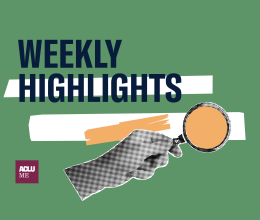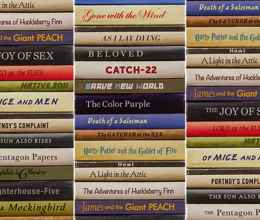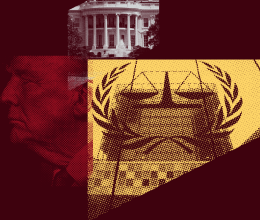My favorite banned book is also the subject of one of my favorite First Amendment cases (and one of my favorite ACLU cases). In Ulysses, James Joyce attempts to capture every moment of everyday life, in as much detail as possible, and everyday life (at least according to Joyce) includes a great deal of frank thought (and a small bit of explicit action) of a sexual nature. Characters notice the physical qualities of one another, they recall sexual situations from their pasts, and they plan sexual encounters for their future. There is infidelity, there is masturbation, and a sizable chunk of the end of the novel takes place in a brothel.
All of this made the publication of Ulysses in 1922 an exceedingly unlikely event. The typesetting of the novel was done in France, by printers who did not know English. This made it easier to avoid censorship, though it did result in a comically high number of typographical errors. Import of Ulysses was banned in the United States under the obscenity laws, and in 1933 Random House and the ACLU arranged a test case to challenge the obscenity ban. Customs was notified that Ulysses was going to be shipped into New York, and the book was seized upon arrival. This led to the court case, United States v. One Book Called Ulysses.
James Joyce and the First Amendment were both enormously fortunate that the case was assigned to U.S. District Judge John Woolsey. The government's claim against Ulysses were based on the argument that it was obscene, that it was blasphemy, and that it expressed coarse and barbaric thoughts (essentially, that the book was socially subversive). Judge Woolsey approached these arguments in just the way one would hope a judge would. First, he read the novel (no easy feat). Then, he sought out other people who had read Ulysses (which was still banned in the entire English-speaking world), and he read commentaries on the novel, which were just beginning to appear.
Judge Woolsey concluded that Ulysses was not obscene. "The words which are criticized as dirty," he noted "are old Saxon words known to almost all men, and, I venture, to many women, and are such words as would be naturally and habitually used, I believe, by the types of folk whose life, physical and mental, Joyce is seeking to describe." Of the sexual scenarios detailed in the book, Judge Woolsey counseled that, "In respect of the recurrent emergence of the theme of sex in the minds of his characters, it must always be remembered that his locale was Celtic and his season Spring." It may seem obvious to us now, but it was a rather novel idea in law at the time that there could graphic descriptions of sex that were not designed to titillate. But, Judge Woolsey concluded that while "the effect of Ulysses on the reader undoubtedly is somewhat emetic, nowhere does it tend to be an aphrodisiac."
The history of this case is documented in a wonderful book called "The Trials of Ulysses." And there are a number of great web resources about Ulysses. But, the best way to celebrate banned books week is to just read it. It is not easy, but its totally and completely worth it.
Banned Book Pick: Ulysses
Related Issues
Related content

Weekly Highlights October 14 – 17
October 17, 2025
How NSPM-7 Seeks to Use "Domestic Terrorism" to Target Nonprofits...
October 15, 2025
Weekly Highlights October 6 – 10
October 10, 2025
The Freedom to Read: Defending Libraries and Democracy Against Book...
October 7, 2025
Protecting Free Speech in the Face of Government Retaliation
September 18, 2025
Civil Rights Organizations Urge Students, Parents, and Staff to...
August 26, 2025
Student Speech, Protests, and Walkouts

Court Strikes Down NIH's Unlawful Termination of Research Grants on...
July 21, 2025

